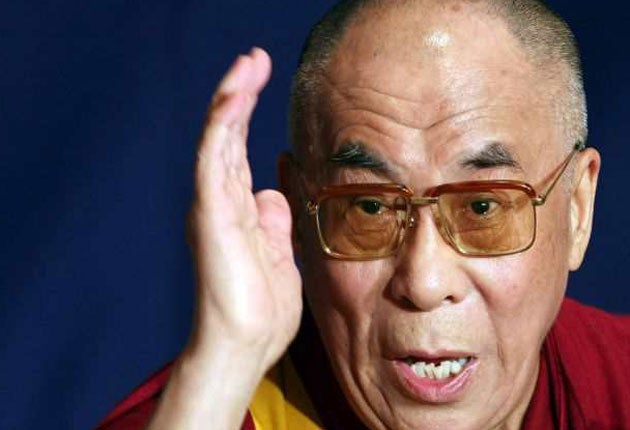Dalai Lama to take a back seat in Tibet's struggle for freedom
Pressure from younger generation leads to tactical shift in campaign for independence from China

Half a century after he fled from the Chinese invasion of Tibet and began campaigning for its freedom, the Dalai Lama is ready to stand down from his role as the movement's political leader, amid mounting personal frustration with the lack of progress.
Hundreds of Tibetans are gathering this week in Dharamsala, India, his base in exile, for a six-day crisis meeting that many believe is the most important for a generation. At issue will be how to proceed in the face of Chinese intransigence. Central to the debate will be the Dalai Lama's offer to take a back-seat role.
"His Holiness has said that China is trying to make this into an issue about him," said Tenzin Taklha, the Dalai Lama's spokesman. "He does not want to be a hindrance. He is taking a back seat at the present time because of a lack of [progress]. This is a very important event for the Tibetan movement. This will be deciding the direction we follow."
The Dalai Lama retains the respect of the Tibetan movement, but there are some who have disagreed with his tactics over the years. While he has garnered worldwide support – including the backing of celebrities such as Richard Gere and Goldie Hawn – not all have supported his promotion of a conciliatory "middle way". In contrast to his call for "meaningful autonomy", a younger, more frustrated generation of Tibetans is demanding full independence.
Tsewang Rigzin, president of the Tibetan Youth Congress, said it was time to chance the "political stand" of the movement. "His Holiness said that if he was becoming a hindrance he would rather not be there," he said. "He called his meeting for the Tibetan people to discuss this."
But it is the lack of progress made by his envoys dispatched to China, and Beijing's hostility to the Dalai Lama, that has led him to believe that others in the Tibetan government-in-exile could better lead the negotiations. Earlier this year, when the Chinese authorities brutally cracked down on Tibetan demonstrators, the head of Tibet's Communist Party, Zhang Qingli, called his Holiness "a wolf in monk's robes, a devil with a human face but the heart of a beast".
Even last week, the Chinese authorities called on India not to permit the meeting. The Foreign Ministry spokes-man Qin Gang said: "The Indian government has made solemn commitments on several occasions that it does not allow any activities on its soil aimed at dividing China. We hope that this commitment can be fulfilled."
Another factor in the 73-year-old Dalai Lama's desire to take a lesser role may be his health. He has had hospital treatment twice since August. Yet he is unlikely to give up his political role altogether. While the Tibetan government-in-exile has held democratic elections for the past decade, the Nobel laureate still holds unparalleled influence. Nor could he give up his position as a living god, something he will retain until death.
Nevertheless, even a decision to take a reduced role would be a huge shift in tactics for the Tibetan movement. "We have failed to bring any positive change inside Tibet," said Samdhong Rinpoche, prime minister of the government-in-exile. "The majority of Tibetans are increasingly frustrated and want more forceful change."
On Friday, the Dalai Lama said in a statement: "Taking into account the inspiring courage being shown by people all over Tibet this year, the current world situation, and the intransigent stance of the government of China, all the participants, as Tibetan citizens, should discuss in a spirit of equality, co-operation and collective responsibility the best possible future course of action to advance the Tibetan cause."
Join our commenting forum
Join thought-provoking conversations, follow other Independent readers and see their replies
0Comments